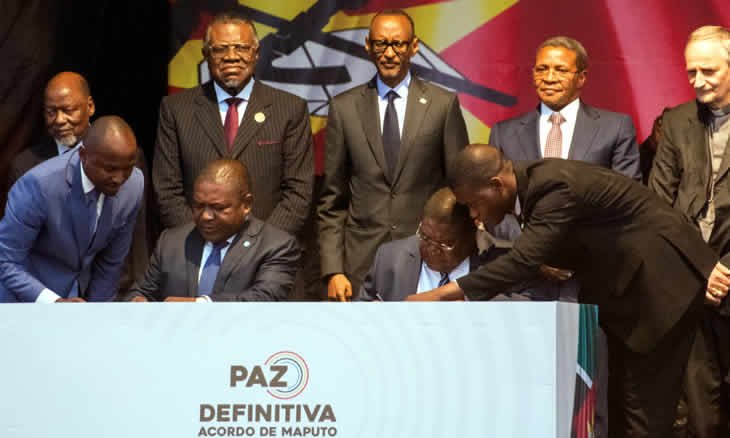Riyaz Patel
The aptly named Maputo Peace Square served as the setting as Mozambique’s government and the former rebel group Renamo completed a long-awaited peace pact Tuesday, inking a final deal aimed at ending years of conflict which has claimed close to a million lives.
The deal was signed by President Filipe Nyusi and Renamo leader Ossufo Momade and witnessed by regional, continental and international leaders.

Thousands of people applauded as the two leaders showed the signed the Maputo Peace and Reconciliation Agreement

The UN’s special envoy on Mozambique, Mirko Manzoni, said it was a “truly historic day… This agreement will bring ultimate peace in a country that has seen enough suffering,”
The deal comes just two months before general elections on October 15 that the ruling Frelimo party, the dominant political force for more than four decades, is expected to win.
“The signing of this agreement will pave way for peaceful elections,” President Cyril Ramaphosa said.

Renamo, founded as an anti-communist guerrilla group, unleashed a civil war against the Marxist Frelimo government shortly after independence from Portugal in 1975.
The brutal fighting – seen by many historians as a proxy conflict between East and West during the Cold War – lasted 16 years.
The war ended when the Soviet Union, backing Frelimo, and apartheid-era South Africa, supporting Renamo, scaled back their support leading to direct peace talks.
The rebel movement then entered politics after a 1992 peace pact which was signed in Rome, paving the way for multi-party elections in 1994.

Renamo lost that vote, and subsequent elections, becoming the official opposition party, but retaining its armed wing.
In October 2013, Renamo renounced the 1992 peace deal and clashes erupted again between government forces and Renamo soldiers, lasting until 2016.
On August 1, the two rivals signed a precursor accord in Gorongosa National Park under which they formally agreed to end military hostilities.

“This agreement will be successful because it is peace made by Mozambicans and for Mozambicans. A break with the past,” said Manzoni.
Portugal, the former colonial power, expressed “deep satisfaction… (at) the new chapter opening today.”
“This agreement, the result of a long negotiation process, represents fundamental progress in building peace,” the foreign ministry said in Lisbon.
Last week Renamo began disarming armed members as part of the peace deal.
Some of the demobilised fighters will be absorbed into Mozambique’s army and police, while others will be reintegrated into civilian life.

More than 5,200 Renamo fighters are expected to surrender their weapons to the government.
But Renamo is suffering internal divisions.
A small group of disgruntled members is vowing not to turn in their arms and are refusing to recognise the new leader Momade, who has already been nominated as Renamo’s presidential candidate for the October elections.
Nyusi warned last week that any Renamo fighters who chose not to hand in their weapons under the ongoing disarmament programme would be “hunted down.”
